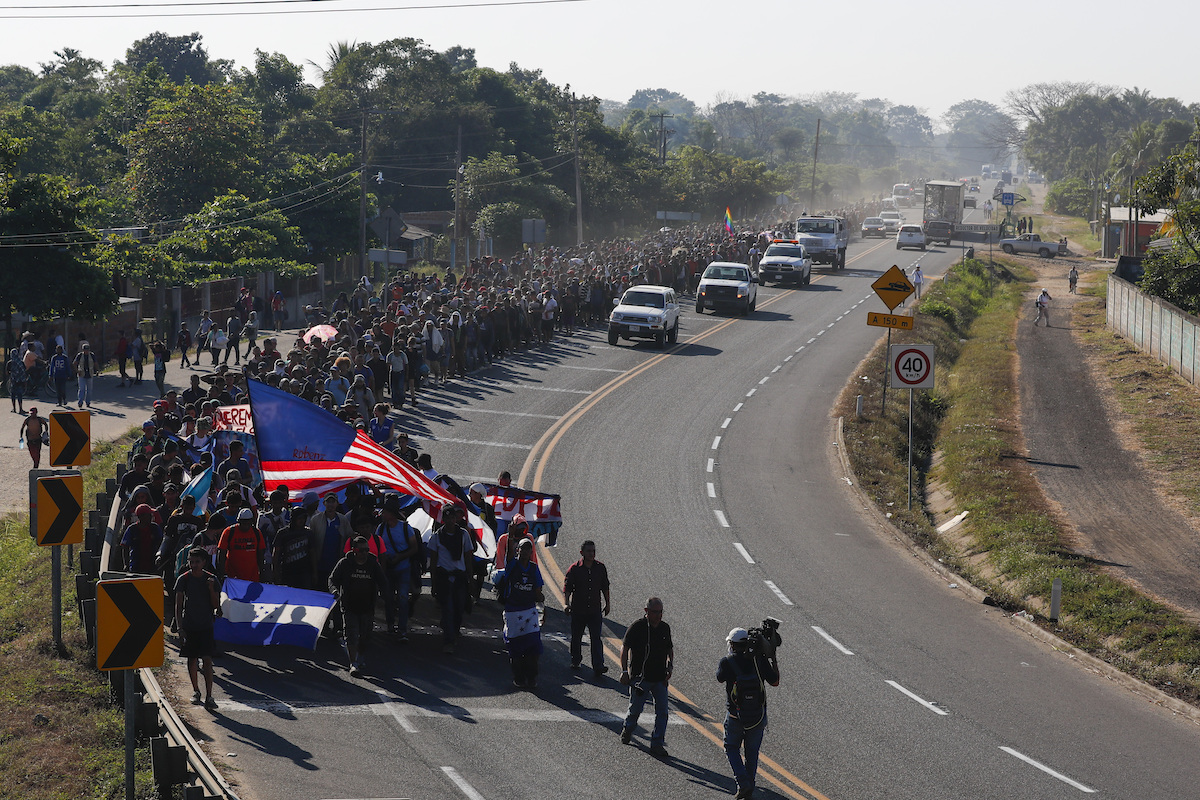

Central American migrants walk in Ciudad Hidalgo, Mexico, Thursday, January 23, 2020. (AP Photo/Marco Ugarte)
Most liberal media reporting in the United States vaguely references U.S. political “interventionism” which destabilized nations in Central America, and more specifically emphasizes “widespread “crime” in the region. Refugees are described as fleeing from those two evils.
There is certainly truth to those descriptors. Pointing to U.S. government involvement in explaining the current migration crisis needs to be more specific, given there has been no direct military U.S. presence in the region for nearly 30 years. U.S. interventionism occurs in other very direct ways which increase social violence in the region. A telling example: the U.S. government, under Obama, was the only country in the hemisphere that did not denounce the 2009 military coup and subsequent political repression in Honduras and later accepted the new government as valid, despite clear evidence of corruption in the election process. With regards to the very real issue of criminal activity, media emphasis on the notion of “widespread crime” serves to augment public perception, fueled by former President Trump, of Central American migration as opening the door to the U.S. being infiltrated by a wave of dangerous criminals.
Absent in all media reporting are the U.S. economic drivers behind massive out-migration from the region: the “free trade” treaties, NAFTA for Mexico, and CAFTA for Central America, which have displaced millions in all the countries involved, especially from agricultural areas. “Free trade,” advocated by both Republicans and Democrats —liberal economist Paul Krugman has been a major advocate, Obama and Trump championed it as did Bush and Clinton before him, and so does Biden— has wreaked havoc with the agricultural sector across Mexico and Central America, driving families from the land and destroying local economies.
U.S. economic policies have helped turn some Central American countries into unsafe prisons of poverty from which even minor children are trying to escape. UCLA sociologist Leisy Abrego explains:
“In 2004, Congress passed the Central American Free Trade Agreement (CAFTA). Supporters argued that eliminating trade tariffs and opening access to new markets would improve the economy for all. Many studies, including my own, show that such policies only exacerbate social and economic inequalities throughout Central America. CAFTA benefits corporations, allowing them to pay workers a small fraction of what they would pay in the United States, and not enough for full-time workers to evade poverty. By supporting these practices, our government makes us complicit in deplorable conditions that force migration.” HuffPost Latino Voices. July 9, 2014, “Rejecting Obama’s Deportation and Drug War Surge on Central American Kids.”
CAFTA’s impact has been the devastation of Central American economies. In particular, family farmers’ ability to make a living has been destroyed by cheap, subsidized, U.S. agribusiness imports. CAFTA restructured trade relations with the region and gave unprecedented power to U.S. corporations such as Monsanto, which is on the brink of creating a monopoly for its genetically modified seeds.
Major social upheavals like the current migration from Central America usually have several, sometimes inter-related causes. Discussing details of a “free trade agreement” is not the kind of “sexy” item that lends itself to easy media coverage. But the reality is that the massive movement from south of the U.S. border has been caused in good measure by bipartisan U.S. economic policies toward Central America that have developed over the past 15 years and are now bearing their inevitable bitter fruit.
We can’t expect a corporate liberal media to expose the central role played by U.S. corporations, banks, the State and Defense Departments, Congress and successive Presidents in creating the conditions for what is happening at the U.S.-Mexico border. We can and must study —and work to mitigate— the ongoing harm caused by very specific U.S. economic policies such as CAFTA in addition to various forms of political intervention in Central America.
***
Raul Fernandez is Professor Emeritus of the Department of Chicano/Latino Studies at UC Irvine.



All countries involved in nafta/cafta signed those treaties?
Excellent essay!
Yes the countries did sign the CAFTA agreement. But, there was much misinformation and manipulation of opinion polls to reduce CAFTA opponents’ votes. I was there. (Costa Rica) I saw firsthand how poll manipulation (wrongly projecting non-existent huge margins of “support” for CAFTA) caused many opponents simply to not vote. It was a travesty. The results have been just as predicted, huge gains by large multi-national corporations (Walmart, McD, etc) at expense of local small businesses.